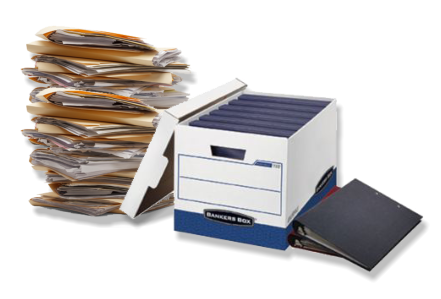

© Copyright 2022 - MakoShred - 2910 E Route 66 -
Flagstaff, AZ 86004 - (928) 522-6256
Stop Identity Theft at Tax
Time
Tax time is a busy time not just for accountants – but for identity thieves too. Identity thieves use sophisticated phishing scams online to gather personal information. They also find – and steal – tax returns and other sensitive documents by going through garbage containers and recycling bins. The cost to victims of identity theft is an estimated five billion dollars per year in the US. Furthermore, if your identity is stolen it can be a long and frustrating process to undo all the damage. It’s important to know which documents you have to keep and which ones you can dispose of securely. Here’s a guide: • Keep tax returns for four years after they are filed. • Once you have the annual statement for taxable investments, dispose of all the monthly statements you’ve received. Document shredding is the most secure method of disposal. E-waste can be shredded too. • Keep bank statements that back up information on tax returns for up to seven years. Otherwise, shred them. • Destroy canceled checks after a year unless they confirm information on your tax return. • Keep credit card statements for big purchases and charitable contributions. Otherwise, shred statements. • Shred pay stubs after you have received payment. • Keep records of retirement plan contributions indefinitely.Paper Recycling Facts
• To produce each week's Sunday newspapers, 500,000 trees must be cut down. • Recycling a single run of the Sunday New York Times would save 75,000 trees. • If all our newspaper was recycled, we could save about 250,000,000 trees each year! • If every American recycled just one-tenth of their newspapers, we would save about 25,000,000 trees a year. • If you had a 15-year-old tree and made it into paper grocery bags, you'd get about 700 of them. A busy supermarket could use all of them in under an hour! This means in one year, one supermarket can go through over 6 million paper bags! Imagine how many supermarkets there are just in the United States!!! • The average American uses seven trees a year in paper, wood, and other products made from trees. This amounts to about 2,000,000,000 trees per year! • The amount of wood and paper we throw away each year is enough to heat 50,000,000 homes for 20 years. • Approximately 1 billion trees worth of paper are thrown away every year in the U.S. • Americans use 85,000,000 tons of paper a year; about 680 pounds per person. • The average household throws away 13,000 separate pieces of paper each year. Most is packaging and junk mail. • In 1993, U.S. paper recovery saved more than 90,000,000 cubic yards of landfill space. • Each ton (2000 pounds) of recycled paper can save 17 trees, 380 gallons of oil, three cubic yards of landfill space, 4000 kilowatts of energy, and 7000 gallons of water. This represents a 64% energy savings, a 58% water savings, and 60 pounds less of air pollution! • The 17 trees saved (above) can absorb a total of 250 pounds of carbon dioxide from the air each year. Burning that same ton of paper would create 1500 pounds of carbon dioxide. • The construction costs of a paper mill designed to use waste paper is 50 to 80% less than the cost of a mill using new pulp. Information from Recycling RevolutionPatient Privacy and Data
Security
“A lot of healthcare organizations figure their mission in life is to treat people and get them well, it’s really not about patient data security,” Larry Ponemon, chairman and founder of the Ponemon Institute, told InformationWeek Healthcare. But, of course, it is about patient data security too – and that was his point. Ponemon was discussing the 2014 Benchmark Study on Patient Privacy and Data Security by Ponemon Institute. Specifically, criminal attacks on healthcare systems have risen a startling 100 percent since we first conducted the study in 2010. This year, we found the number and size of data breaches has declined somewhat. Employee negligence is a major risk and is being fueled by BYOD (the practice of allowing the employees of an organization to use their own computers, smartphones, or other devices for work purposes/Bring Your Own Device or BYOD). Giving healthcare organizations major headaches are: risks to patient data caused by the Affordable Care Act, exchange of patient health information with Accountable Care Organizations and lack of trust in business associates privacy and security practices. The report estimates that data losses and security breaches cost the U.S. health care industry about $6.5 million. One clear message the study sends is that health care organizations – like all organizations that handle sensitive information – need to increase awareness among employees about the importance of safeguarding private information. Safeguarding means protecting sensitive information until it is no longer needed, then disposing of documents securely. Shredding confidential documents with MakoShred is a secure and trusted method of destruction. Information from: Fourth Annual Benchmark Study on Patient Privacy & Data Security Presented by Ponemon Institute, March 2014

Secure Document & Data Destruction
Paper Recycling



© Copyright 2022 - MakoShred - 2910 E Route 66 - Flagstaff, AZ 86004 - (928) 522-6256
Stop Identity Theft at Tax Time
Tax time is a busy time not just for accountants – but for identity thieves too. Identity thieves use sophisticated phishing scams online to gather personal information. They also find – and steal – tax returns and other sensitive documents by going through garbage containers and recycling bins. The cost to victims of identity theft is an estimated five billion dollars per year in the US. Furthermore, if your identity is stolen it can be a long and frustrating process to undo all the damage. It’s important to know which documents you have to keep and which ones you can dispose of securely. Here’s a guide: • Keep tax returns for four years after they are filed. • Once you have the annual statement for taxable investments, dispose of all the monthly statements you’ve received. Document shredding is the most secure method of disposal. E-waste can be shredded too. • Keep bank statements that back up information on tax returns for up to seven years. Otherwise, shred them. • Destroy canceled checks after a year unless they confirm information on your tax return. • Keep credit card statements for big purchases and charitable contributions. Otherwise, shred statements. • Shred pay stubs after you have received payment. • Keep records of retirement plan contributions indefinitely.Paper Recycling Facts
• To produce each week's Sunday newspapers, 500,000 trees must be cut down. • Recycling a single run of the Sunday New York Times would save 75,000 trees. • If all our newspaper was recycled, we could save about 250,000,000 trees each year! • If every American recycled just one-tenth of their newspapers, we would save about 25,000,000 trees a year. • If you had a 15-year-old tree and made it into paper grocery bags, you'd get about 700 of them. A busy supermarket could use all of them in under an hour! This means in one year, one supermarket can go through over 6 million paper bags! Imagine how many supermarkets there are just in the United States!!! • The average American uses seven trees a year in paper, wood, and other products made from trees. This amounts to about 2,000,000,000 trees per year! • The amount of wood and paper we throw away each year is enough to heat 50,000,000 homes for 20 years. • Approximately 1 billion trees worth of paper are thrown away every year in the U.S. • Americans use 85,000,000 tons of paper a year; about 680 pounds per person. • The average household throws away 13,000 separate pieces of paper each year. Most is packaging and junk mail. • In 1993, U.S. paper recovery saved more than 90,000,000 cubic yards of landfill space. • Each ton (2000 pounds) of recycled paper can save 17 trees, 380 gallons of oil, three cubic yards of landfill space, 4000 kilowatts of energy, and 7000 gallons of water. This represents a 64% energy savings, a 58% water savings, and 60 pounds less of air pollution! • The 17 trees saved (above) can absorb a total of 250 pounds of carbon dioxide from the air each year. Burning that same ton of paper would create 1500 pounds of carbon dioxide. • The construction costs of a paper mill designed to use waste paper is 50 to 80% less than the cost of a mill using new pulp. Information from Recycling RevolutionPatient Privacy and Data Security
“A lot of healthcare organizations figure their mission in life is to treat people and get them well, it’s really not about patient data security,” Larry Ponemon, chairman and founder of the Ponemon Institute, told InformationWeek Healthcare. But, of course, it is about patient data security too – and that was his point. Ponemon was discussing the 2014 Benchmark Study on Patient Privacy and Data Security by Ponemon Institute. Specifically, criminal attacks on healthcare systems have risen a startling 100 percent since we first conducted the study in 2010. This year, we found the number and size of data breaches has declined somewhat. Employee negligence is a major risk and is being fueled by BYOD (the practice of allowing the employees of an organization to use their own computers, smartphones, or other devices for work purposes/Bring Your Own Device or BYOD). Giving healthcare organizations major headaches are: risks to patient data caused by the Affordable Care Act, exchange of patient health information with Accountable Care Organizations and lack of trust in business associates privacy and security practices. The report estimates that data losses and security breaches cost the U.S. health care industry about $6.5 million. One clear message the study sends is that health care organizations – like all organizations that handle sensitive information – need to increase awareness among employees about the importance of safeguarding private information. Safeguarding means protecting sensitive information until it is no longer needed, then disposing of documents securely. Shredding confidential documents with MakoShred is a secure and trusted method of destruction. Information from: Fourth Annual Benchmark Study on Patient Privacy & Data Security Presented by Ponemon Institute, March 2014

Secure Document & Data Destruction - Paper Recycling
Secure Document & Data Destruction - Paper Recycling
Our Blog
























